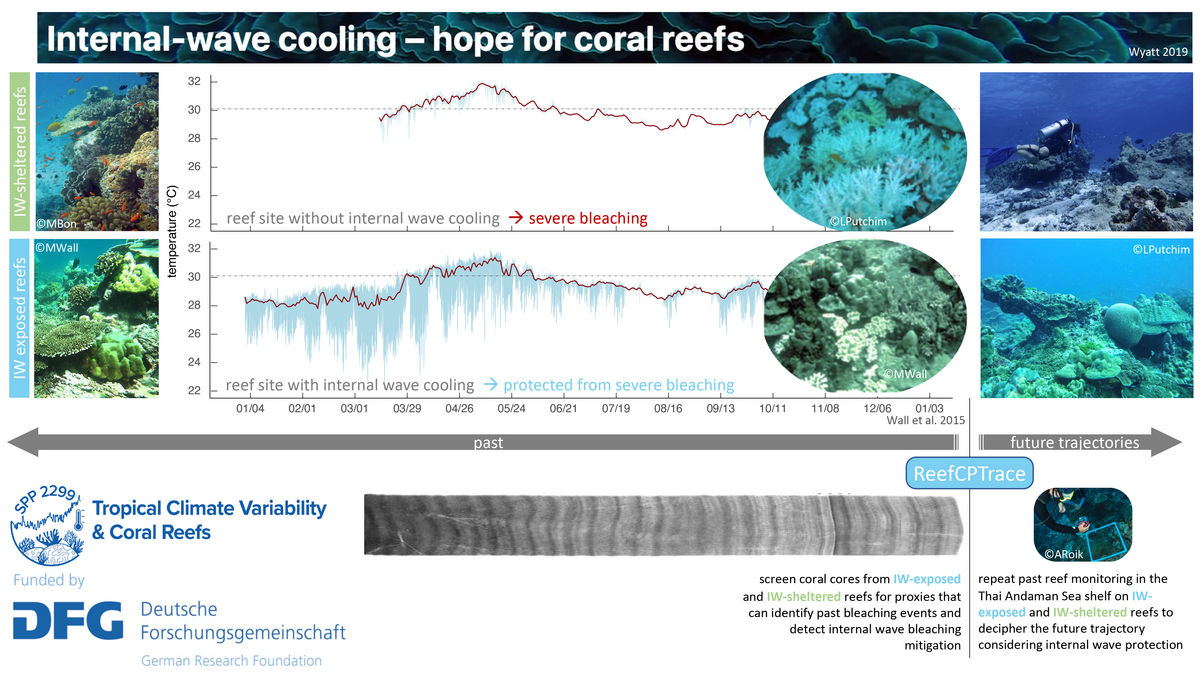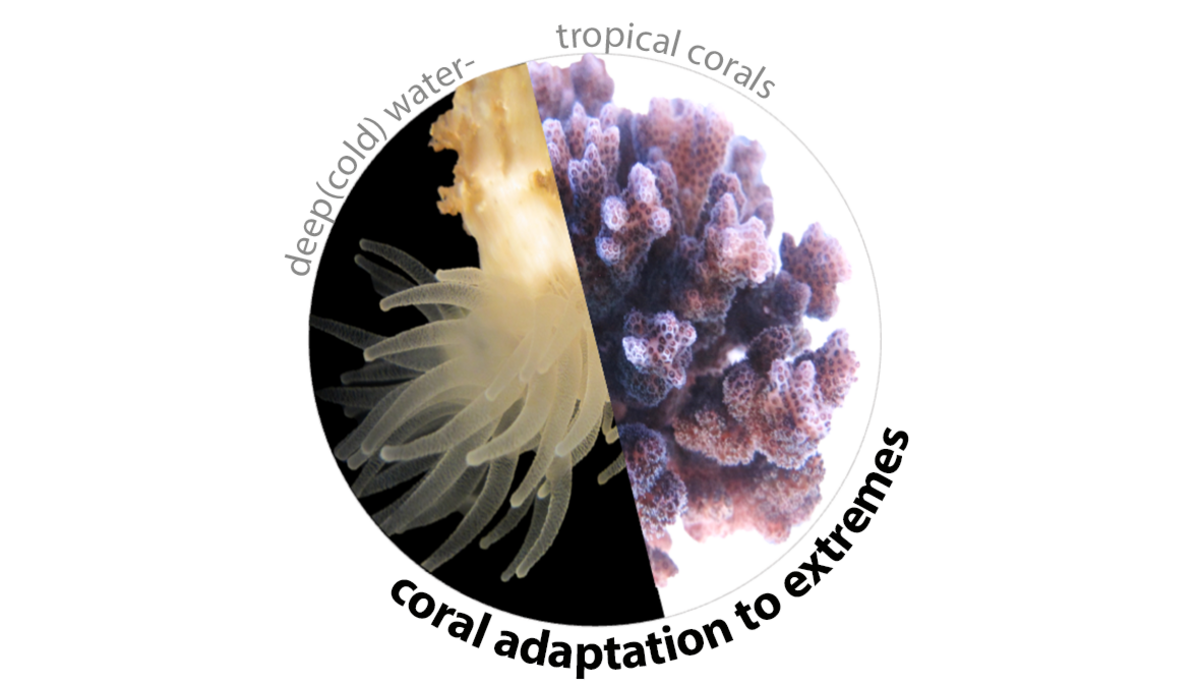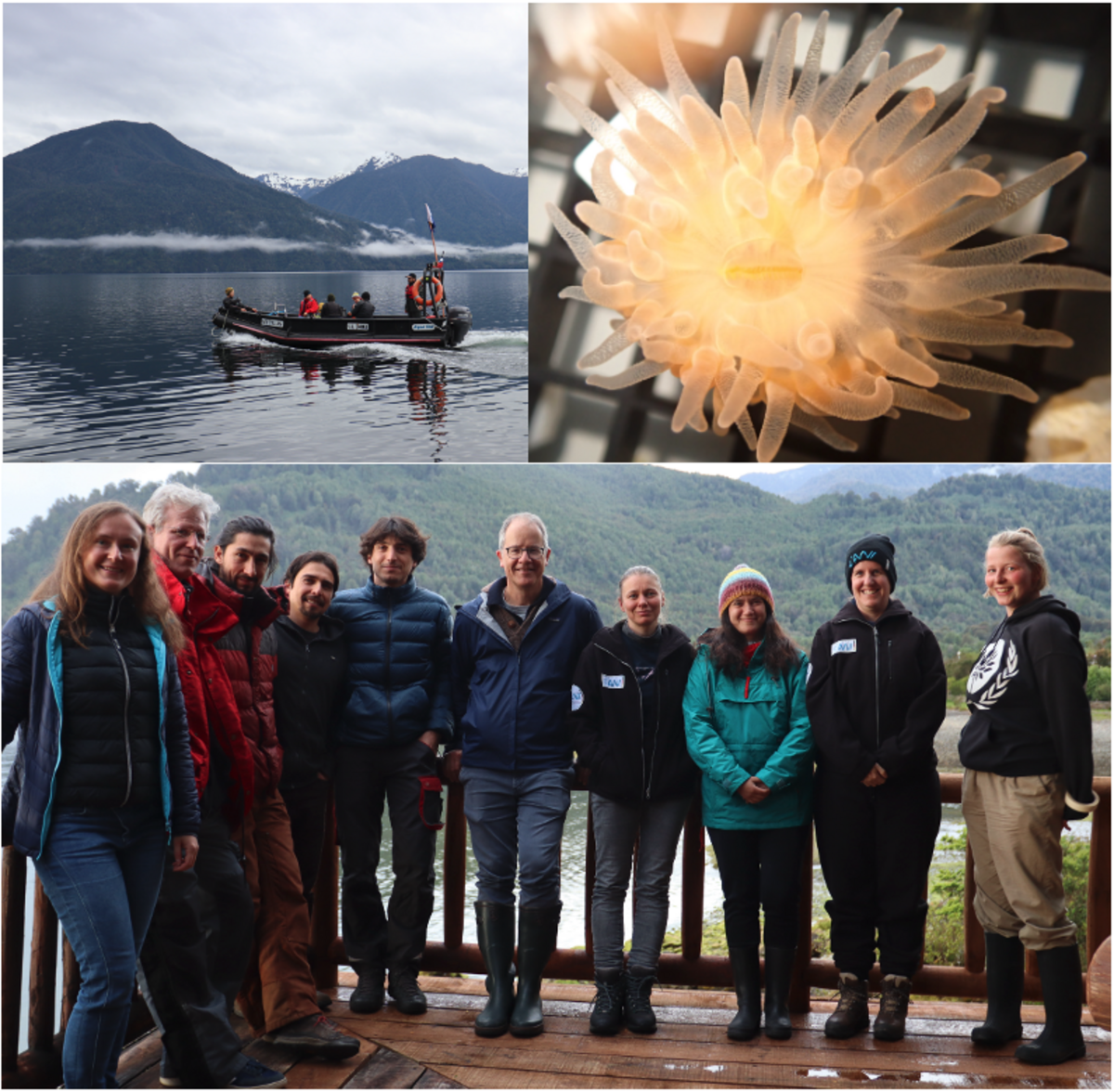Working Group: Coral Adaptation to Extremes
For our research, we use sites along a continuum of changing environmental conditions that either mimic future changing conditions or are representative of other known anthropogenic pressures on ecosystems. These sites provide us with natural laboratories where we can study how organisms acclimate or even adapt to these habitats through phenotypic plasticity, changes in their microbial associations or genotypic composition
Research Area and Focus
Tropical coral reefs
In the tropics, we are exploring natural gradients, in the coral reefs of the Andaman Sea, where for instance cooling by internal waves protected corals during a severe bleaching event in 2010. In addition, corals that thrive in an environment influenced by internal waves were more resilient to thermal stress and thus prepared for such extreme events and possibly also for future ocean warming. A topic that is also being investigated as part of the current DFG Priority Programme SPP2299 (Tropical Climate Variability & Coral Reefs). Within the SPP2299, our project focusses on the ability of internal waves to protect reefs and thus contribute to the sustainability of reefs in the future. It is in line with another SPP2299 project that aims to reconstruct the thermal variability and stress events since the Little Ice Age in the same area and whether internal waves have also helped to protect against heat stress in the past (PI: Thomas Felis @ MARUM).
We also utilise other strong gradients of environmental variability along the reefs from the shoreline to the reef slope. We study the coral genets of different coral species from intertidal to subtidal habitat to explore intra- and interspecific phenotypic variations. The aim is to better understand the interaction between local environmental conditions, coral phenotypes and reef structure and what this can tell us about the future of coral reefs.
Cold-water corals
Environmental fluctuations also play a role in the fitness of cold-water corals, and at the limits of their distribution this can cause additional stress and have a negative impact on their metabolism and presumably their fitness. This also means that their fatty acid balance is affected and lipid reserves are likely to be more depleted than in habitats with less environmental variability. Despite their remoteness, the Patagonian fjords are subject to anthropogenic pressures from intensive aquaculture, but the impact on neighbouring benthic communities is less well understood, including the potential impact on the diverse and dense cold-water coral reefs in this region. While we are interested in assessing the health of corals in the region along natural physico-chemical environmental gradients, we have recently begun to investigate the role of aquaculture and whether it contributes to shifts in coral-associated bacterial taxa and what problems this may pose for coral health. The Comau Fjord in Patagonia, Chile, is an ideal system to study these issues, which also has implications for other fjord systems in the region.
Team
Dr. Marlene Wall (group leader) - Working on coral ecophysiology, ecology, acclimation and phenotypic plasticity in both tropical and cold-water corals.
MSc Merlin Weichler (research assistant) - Trophic position and thermal tolerance in tropical corals due to deep-water energy subsidies; Ecological consequences: What are the ecological ramification of thermal refugia by internal waves? Can they help to maintain coral biodiversity? GEOMAR
MSc Ignacia Acevedo Romo (research assistant) - Trophic strategy and energy reserve dynamics in the cold-water coral Desmophyllum dianthus, Comau Fjord, Patagonia, Chile. GEOMAR
MSc Reshma Thachara Kunnath (research assistant) - Exploring the basis of thermal tolerance of corals around Phuket Island, Andaman Sea, Thailand - from microbial associations towards tuning of gene expression patterns. GEOMAR
MSc Jessica Vince (student assistant) - Exploration of coral energetics and microbial associations in the Andaman Sea, Thailand. GEOMAR
BSc Lukas Krause (master student) - Heat-stress tolerance in tropical corals; Small-scale contrasting heat stress tolerance patterns of the coral Pocillopora acuta around Phuket island, Thailand. Christian Albrechts University
BSc Juhyeon Kim (master student @ AWI) - Symbiont composition along natural environmental gradients and its link to heat tolerance, Diversity and Adaptability of coral symbionts in the ubiquitous coral Pocillopora acuta in Response to Host and Environmental Factors around Phuket Island, Thailand. University of Bremen
BSc Andrea Padillo Bonillo (master student) - Evaluation of the physiological response of the hydrothermal vent mussel Bathymodiolus azoricus to sediment plumes mimicking potential mining activities. University of Hamburg
BSc Max George (master student) - eDNA metabarcoding of coral reefs: tracing community shifts and detecting drivers in a warming ocean. Christian Albrechts University
Mailin Suchantke (bachelor student in cooperation with Prof. Ute Hentschel-Humeida) - Shifts in culture-dependent bacterial communities associated with cold-water corals near and far from salmon farm activity and their resistance to antibiotics. Christian Albrechts University
Former Members
- Patrick Deprie (BSc) - Christian Albrechts University
- Dr. Anna Berezkina (PhD) - Alfred-Wegener Institute
- Dr. Kristina Beck (PhD) - University of Edinburgh (PostDoc)
- Anna Fiesinger (MSc) - University of Konstanz (PhD)
- Andrea L Schmidt (MSc) - NOAA Fisheries (Research Associate)
- Carina Krämer (BSc) - University of Bremen (MSc)
- Antonia Kayser (BSc) - University of Oldenburg (MSc)
- Marie Rutsch (MSc) - University of Vienna (PhD)
- Marie Sieberns (MSc) - Spitzbergen UNIS
- Anjleen Hannak (BSc) - University of Bremen (MSc)
- Conrad Vanessa (MSc) - Botanika GmbH
- Laura Niewendick (MSc) - GIZ Deutsche Gesellschaft für International Zusammenarbeit
- Manding Suraweh (MSc) - GIZ Deutsche Gesellschaft für International Zusammenarbeit
- Mildred Johnson (MSc) - University of Vienna (PhD)
Projects
ReefCPTrace: Reef-scale climate protection – screening coral skeletal records for proxy traces of natural bleaching mitigation by internal waves
Ongoing global warming and increased prevalence and magnitude of heatwaves threaten coral reef persistence in many tropical regions wordwide by causing bleaching and mass mortality. The aim of this project is to obtain an improved understanding of the future fate of coral reefs by learning from the past. Cold water, supplied by wind-driven mixing, upwelling or breaking internal waves, has been shown to considerably enhance coral survival during marine heat waves, both at local and regional scales. However, we do not know whether cooling events occur regularly enough at specific locations to serve as a protection mechanism for reefs. A better understanding of beneficial reef cooling dynamics through time can be critical for improved reef management. Studying the coral skeletal record of past bleaching events in regions with known occurrence of cooling events will allow me to address this question. This project will focus on internal waves (IWs) in the Andaman Sea, Thailand. Here, reefs exposed to IWs have been shown to be protected from severe bleaching and mortality, in contrast to reefs sheltered from IW influence in the same region. The Andaman Sea represents an ideal natural laboratory to address the project goal, especially as multiple replicated IW-sheltered vs. IW-exposed reef sites are available. My main aims are to use the coral skeletal record to a) identify a suite of proxies that can unequivocally trace thermal bleaching stress, b) identify how internal wave forcing modulates these proxies and c) ultimately apply these proxies to coral cores that cover bleaching events during the last three decades to decipher whether IWs mitigated bleaching responses during these events. Combined with natural recovery rates from the 2010 severe bleaching (by repeating previous field monitoring of IW-sheltered as well as IW-exposed reefs) and linked with projections of future marine heat wave events, my project will enable more robust forecasts of future reef-persistence and predictions regarding the role of IW exposed reef locations as prime conservation targets.






